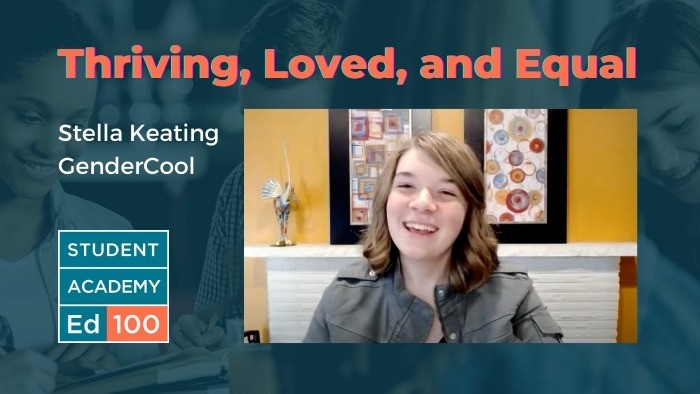What is the Equality Act?

Civil rights on hold in the US Senate
Stella Keating, a student spokesperson for the GenderCool Project, earned a degree of fame in 2021 for her testimony before a committee of the US House of Representatives. California laws broadly prohibit discrimination on the basis of gender, but some forms of discrimination remain legal in many US states. Partly as a result of Stella’s testimony, in February 2021 the US House of Representatives voted 224 to 206 to pass the Equality Act, a bill that would prohibit discrimination on the basis of sex, gender identity, and sexual orientation in all US states and territories. The job is not done — the bill is stuck in the Senate.
Stella also spoke to members of the Ed100 Academy for Student Leaders — watch and you’ll see why her testimony was so important.
Putting a friendly face to a big change
Stella and her fellow GenderCool “champions” are playing an essential role by bringing human faces and young voices to conversations about equality under the law for people of all sexual orientations and gender identities. Public attitudes are shifting, quickly but unevenly. According to polls by Gallup, in 2020, 5.6% of all adults self-identified as LGBT, an increase of a full percentage point versus the poll three years prior. This figure can be expected to rise dramatically in coming years, because it varies significantly by generation.
Based on the survey results, Gallup took a shot at characterizing the overall prevalence of LGBT people in America: “Rebasing these percentages to represent their share of the U.S. adult population finds 3.1% of Americans identifying as bisexual, 1.4% as gay, 0.7% as lesbian and 0.6% as transgender.”
This estimate of the national average needs to be considered in context — it conceals major variations by generation in a way that massively understate the scale of interest in equality on this issue:
Social science research on this topic is complex. In general, adults in older generations are less likely to express an LGBT identity on surveys than those in younger generations. Responses may reflect an individual’s personal identity, but may also reflect an individual’s public identity. Direct survey research about LGBTQ+ youth is fairly scarce, for reasons of practicality, privacy and safety, as explained by The Trevor Project.
The 2020 Gallup survey underscored the complex connections between many aspects of identity, including generational identity, religious identity, gender identity, and sexual identity. Political identity plays a role, too — compared to Republicans, Democrats were more than five times more likely to identify as LGBT in their response to the survey.
The average US Senator is over 64 years old. Given the large generational divide on this issue, youth voices like Stella’s are especially crucial in policy discussions related to gender equality under the law. In the US Senate, work to pass the Equality Act is being led by Oregon Senator Jeff Merkley.
Tags on this post
DiversityAll Tags
A-G requirements Absences Accountability Accreditation Achievement gap Administrators After school Algebra API Arts Assessment At-risk students Attendance Beacon links Bilingual education Bonds Brain Brown Act Budgets Bullying Burbank Business Career Carol Dweck Categorical funds Catholic schools Certification CHAMP Change Character Education Chart Charter schools Civics Class size CMOs Collective bargaining College Common core Community schools Contest Continuous Improvement Cost of education Counselors Creativity Crossword CSBA CTA Dashboard Data Dialogue District boundaries Districts Diversity Drawing DREAM Act Dyslexia EACH Early childhood Economic growth EdPrezi EdSource EdTech Education foundations Effort Election English learners Equity ESSA Ethnic studies Ethnic studies Evaluation rubric Expanded Learning Facilities Fake News Federal Federal policy Funding Gifted Graduation rates Grit Health Help Wanted History Home schools Homeless students Homework Hours of opportunity Humanities Independence Day Indignation Infrastructure Initiatives International Jargon Khan Academy Kindergarten LCAP LCFF Leaderboard Leadership Learning Litigation Lobbyists Local control Local funding Local governance Lottery Magnet schools Map Math Media Mental Health Mindfulness Mindset Myth Myths NAEP National comparisons NCLB Nutrition Pandemic Parcel taxes Parent Engagement Parent Leader Guide Parents peanut butter Pedagogy Pensions personalized Philanthropy PISA Planning Policy Politics population Poverty Preschool Prezi Private schools Prize Project-based learning Prop 13 Prop 98 Property taxes PTA Purpose of education puzzle Quality Race Rating Schools Reading Recruiting teachers Reform Religious education Religious schools Research Retaining teachers Rigor School board School choice School Climate School Closures Science Serrano vs Priest Sex Ed Site Map Sleep Social-emotional learning Song Special ed Spending SPSA Standards Strike STRS Student motivation Student voice Success Suicide Summer Superintendent Suspensions Talent Teacher pay Teacher shortage Teachers Technology Technology in education Template Test scores Tests Time in school Time on task Trump Undocumented Unions Universal education Vaccination Values Vaping Video Volunteering Volunteers Vote Vouchers Winners Year in ReviewSharing is caring!
Password Reset
Search all lesson and blog content here.
Login with Email
We will send your Login Link to your email
address. Click on the link and you will be
logged into Ed100. No more passwords to
remember!














Questions & Comments
To comment or reply, please sign in .